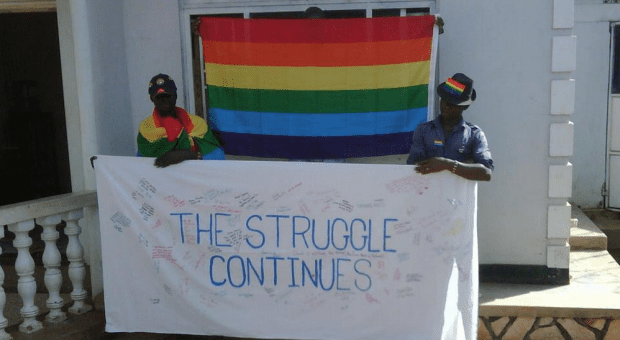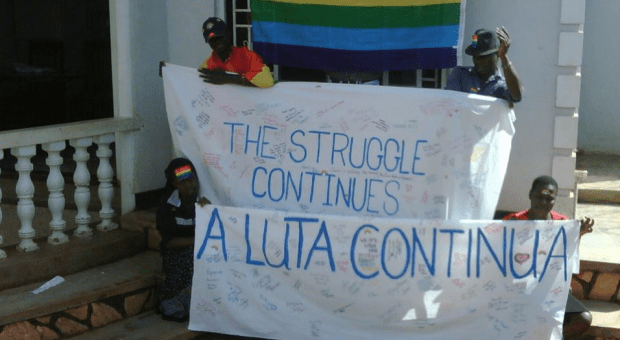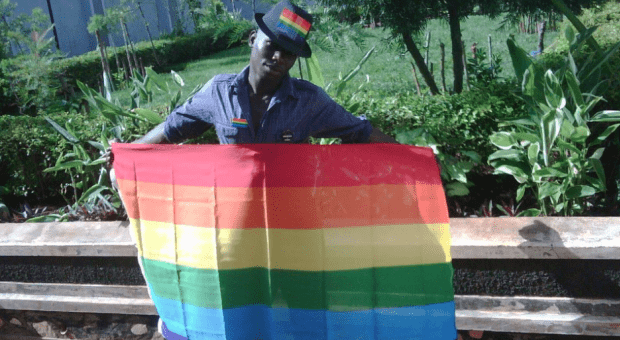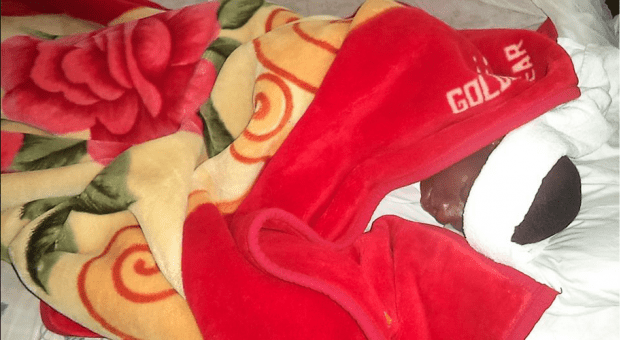
Members of GEHO pose with rainbow flags and banners sent from Toronto activists in April. Credit: GEHO

Members of GEHO pose with rainbow flags and banners sent from Toronto activists in April. Credit: GEHO

Members of GEHO pose with rainbow flags and banners sent from Toronto activists in April. Credit: GEHO
A Ugandan gay activist is fighting for her life after a frightening attack just outside Jinja, in eastern Uganda.
Jeniffer Ikanza, 25, is part of Gender Equality and Health Organization (GEHO), a queer group in Jinja that operates a network of safe houses for LGBT people fleeing homophobic families and police arrest.
GEHO executive director Andrew Waiswa says the attack happened on Aug 18. Ikanza got a call about a woman in trouble from a neighbouring village. The woman said that her husband didn’t know she’s bisexual and that she feared she might be killed if he found out. She told Ikanza that she desperately needed someone to talk to.
On her way there, Ikanza was attacked by a mob, Waiswa says. “Just before reaching her destination, she heard a woman call out to her. Jeniffer doesn’t know if that was the same woman who phoned her. Suddenly, a gang of women came out from the bush out of the blue and started beating her, kicking her and throwing rocks at her.
“In that moment of panic and fear, she fainted. When she fainted and stopped moving, the mob thought she was already dead, so they took off. When I got to the scene she was bleeding and motionless.”
Ikanza, the coordinator of the health and care program for lesbians at GEHO, has been a powerful voice for queer women in Jinja, Waiswa says.
Waiswa rushed Ikanza to the nearest hospital. She suffered multiple organ failure due to internal bleeding, he says. “Her health is in grave danger. She is at the hospital, where she is slowing dying. The doctors and nurses are not giving her any proper medical attention because they know she can’t afford to pay for the treatment. Help is needed in any form. I am not ready to lose another activist now.”
Ikanza joined GEHO as a client when she was 18 after her family threw her out. “She has not seen her parents or siblings in seven years. Before leaving, her uncle tried to poison her because she is regarded as evil and a curse to the family.”
Through GEHO, she began training in sexual health and human rights, specializing in work with lesbians, trans women and bisexual women, Waiswa says. She quickly became a community leader. “I admire her love for GEHO and asked her to work with us.”
The town of Jinja — with its small and resilient queer community — is more than an hour outside Kampala. “If we lose her, the whole movement is set back. We don’t have a lot of activists like her, who are willing to stand up and be on the frontlines and put themselves in the crossfire, people who will stand up to the government and police.”
Waiswa, who Xtra previously profiled after his return to Uganda after spending two years as a Canadian refugee living in Toronto, anticipates Ikanza’s medical bills will be upwards of $1,200 (Canadian). (If you would like to contribute, Waiswa has a crowd-funding page here.)
“When I was living in Canada, she was here coordinating the programs,” he says. “She is so passionate about her work. She lives this work every day, keeping gay and lesbian people safe and healthy, from the moment she wakes up in the morning.”
The attack has cast a dark shadow over the upcoming Jinja Pride celebration next month, of which Ikanza was a key organizer.
Waiswa wants justice, but he doesn’t think that will ever happen. “I have reported to the police three times, but they refused to pick interest in the case . . . They don’t want to open up a file because she is already a criminal by being a lesbian.”
“The government has a contract with its people to look after us whether we are gay, bisexual, trans or straight, women, men, children. The government must take care of us. But they’re not.”
Queer people in Uganda continue to live in fear and under constant threat of persecution. In 2009, parliamentarians tabled the infamous “Kill the Gays” bill, which has made life for queer Ugandans increasingly dangerous. The bill remains on the parliamentary order paper and could be debated any day.
Homosexuality is already criminalized in the country, but the proposed law increases the penalties. It proposes longer jail terms for homosexual acts than those that already exist, including a life sentence in certain circumstances and the death penalty in others.
The murder of Ugandan gay rights activist David Kato shocked the world in 2011. Kato was beaten to death in his home after he was outed by a local newspaper. Waiswa says attacks on out gay people like Kato and Ikanza are a regular occurrence in Uganda, but most go unreported.
Waiswa is coming to Canada in October to speak about his work in Uganda at the InterPride conference in Montreal. InterPride has offered to pay for his flight and accommodation for the five-day event. Afterward, he plans to spend two weeks in Toronto, where he will host discussions and meet other activists.
Locally, activists are raising funds for GEHO, which survives completely on donations.
On Aug 24 at Glad Day Bookshop, Toronto activist duo Human Positive will be holding a fundraising event, called Kuchu Love, in support of GEHO.
“We need to support the grassroots groups working on the ground saving lives every day,” says Troy Jackson, half of Human Positive. “Often, groups that get funding and donations are fundamentalist, homophobic and anti-sex. I also believe it’s really powerful to tell our stories, which is what the show is all about. Learning about what they need from us.”
Proceeds of this event will help to keep GEHO’s safe houses open, which provide LGBT people with food, medical care, free internet and smartphones. The money also assists activists on the ground in ongoing legal fights against the human rights abuses by Evangelical Christians, Waiswa says.
Another fundraiser for GEHO is planned for Sept 18. It’s called A Luta Continua and Love for the Ugandan Kuchus.
The organizers were also part of a group that sent rainbow flags and signed banners to Uganda in April in a heartwarming show of solidarity with members of Jinja’s queer community, who have an extremely difficult time finding these important symbols in Uganda. (See pictures of the banners in the photo gallery at the top of the page.)
The banners and rainbow flags will be featured prominently in Jinja’s upcoming Pride Week celebration Sept 28. This year’s theme is Winning Straight Allies, so leading up to the main event activists will be rolling up their sleeves to give back even more to the local community by cleaning hospitals, picking up garbage, planting trees and holding a blood drive.
“We’re also organizing music events for everyone, so we can hopefully win some straight allies to our cause,” Waiswa says. “In my community there is a lot of fear of gay people. They think we are evil. They think we’re perverted. But if they start to interact with us, they will see we are just like them.”
“We’ll be giving the Jinja community a gay touch,” he laughs.
A successful second Pride Week in Kampala, organized by members of Sexual Minorities Uganda (SMUG), wrapped up Aug 4. Pictures of their colourful celebrations on the beach can be seen here.

 Why you can trust Xtra
Why you can trust Xtra


